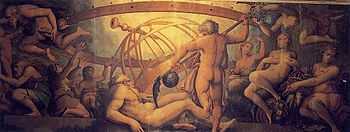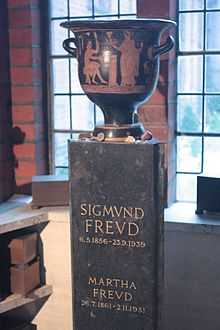 The Castration of Ouranos by Kronos: shows a scene the ancient Greeks themselves found shocking. The fear of castration is so strong in males that people wince in seeing or hearing about it. Likewise, the power of this myth may be in part due to the fact that the desire to kill or harm a family member is strongly taboo. This fresco by Giorgio Vasari and Cristofano Gherardi, c. 1560 is in the Sala di Cosimo I, Palazzo Vecchio.  The Greek vase with Sigmund Freud's ashes in the Golders Green Columbarium is an indication of his strong connection to Greek culture and myth. The psychologist Sigmund Freud used Greek myths such as the story of Oedipus to help explain his theories of psychosexual development. Freud believed that people have strong desires that are taboo, i.e. that society prevents them from expressing. For example, the story of Oedipus includes incest and patricide. Freud saw that most societies had these taboos against incest and patricide, but many if not most also had myths and legends that included these taboos. For Freud, taboo desires and fears expressed themselves in dreams or in myths.
One need not believe in all or any of Freud's ideas about the interpretation of dreams or psychosexual development to accept that stories often reflect unconscious, forbidden desires and fears.
A Freudian definition of myth would be:
Myths reflect strong fears and desires that are taboo and usually unable to be expressed in society.
This simplified Freudian approach makes a claim about what types of stories appeal to an audience. Stories with taboo desires or fears are the types of stories that sell and are passed on to the next generation.
Besides Oedipus, a good example of a classical myth that is open to Freudian interpretation is the story of the castration of Ouranos, the Sky.
Ancient Myth
The Castration of Ouranos
|
|---|
In the Olympian creation myth, as Hesiod tells it in the Theogony, [1] Ouranos came every night to cover the earth and mate with Gaia, but he hated the children she bore him. Ouranos imprisoned Gaia's youngest children in Tartarus, deep within Earth, where they caused pain to Gaia. She shaped a great flint-bladed sickle and asked her sons to castrate Ouranos. Only Kronos, youngest and most ambitious of the Titans, was willing: he ambushed his father and castrated him, casting the severed testicles into the sea. |
For of all the children that were born of Gaia and Ouranos, these were the most terrible, and they were hated by their own father from the first. And he used to hide them all away in a secret place of Gaia so soon as each was born, and would not suffer them to come up into the light: and Uranus rejoiced in his evil doing.
But vast Gaia groaned within, being straitened, and she thought a crafty and an evil wile. Forthwith she made the element of grey flint and shaped a great sickle, and told her plan to her dear sons. And she spoke, cheering them, while she was vexed in her dear heart:
“My children, gotten of a sinful father, if you will obey me, we should punish the vile outrage of your father; for he first thought of doing shameful things.”
So she said; but fear seized them all, and none of them uttered a word. But great Kronos the wily took courage and answered his dear mother:
“Mother, I will undertake to do this deed, for I reverence not our father of evil name, for he first thought of doing shameful things.”
So he said: and vast Gaia rejoiced greatly in spirit, and set and hid him in an ambush, and put in his hands a jagged sickle, and revealed to him the whole plot.
And Ouranos came, bringing on night and longing for love, and he lay about Gaia spreading himself full upon her.
Then the son from his ambush stretched forth his left hand and in his right took the great long sickle with jagged teeth, and swiftly lopped off his own father's testicles and cast them away to fall behind him.
And not vainly did they fall from his hand; for all the bloody drops that gushed forth Gaia received, and as the seasons moved round she bore the strong Erinyes and the great Giants with gleaming armor, holding long spears in their hands and the Nymphs whom they call Meliae all over the boundless earth.
And so soon as he had cut off the testicles with flint and cast them from the land into the surging sea, they were swept away over the ocean a long time: and a white foam spread around them from the immortal flesh, and in it there grew a maiden [ i.e. Aphrodite].
Hesiod, Theogony 155-190
|
| Think about this story of Ouranos and Kronos in terms of Freudian psychology.
Does this way of interpreting myth seem to work for this story, if not for others you know?
What repressed desires are in this myth?
Click here for a possible answer.
The desire to harm one's children, the desire to harm one's spouse,or the desire to harm one's parents are all taboo. Even a temporary expression of these wishes is usually dangerous in society.
What repressed fears are in this myth?
Click here for a possible answer.
Examples include fear of being harmed during sex,fear of castration, fear of being replaced by one's children
Earlier in the story Gaia gave birth to Ouranos. What repressed desire is therefore also in this story?
Click here for a possible answer.
Most world origin myths start with a limited number of characters, so incest seems inevitable and is not stressed in this myth. Nonetheless, one of the features of Hesiod's creation story is that the main characters sleep with their mothers, sons, sisters, or brothers.
|
The passage in the reading revels in the taboo desires to harm one's children, to harm one's spouse, to harm one's parent. It also has the taboo fear of being castrated, being hurt during sex, being hurt by one's spouse, hurt by one's child, or replaced by one's child.
Theories of Myth Interpretation
- Eric Csapo, Theories of Mythology, Wiley, 2005
- Bruce Lincoln, Theorizing Myth: Narrative, Ideology, and Scholarship, University of Chicago Press, 1999
- Andrew Von Hendy, The Modern Construction of Myth, Indiana University Press, 2002
- Myth as Thought: Modern Theory and Myth
- Theories of Myth Interpretation Study Guide, Powell Classical Myth
- Nadia Sels Myth, Mind and Metaphor:On the Relation of Mythology and Psychoanalysis
- Ways of Interpreting Myth
- Theory of Myth - Monmouth College
- APPROACHES TO MYTH: THE SEARCH FOR THE UNIVERSAL THEORY
- Interpreting Myth flashcards | Quizlet
- WAYS OF INTERPRETING MYTH
References
- ↑ Hesiod, Theogony 133 ff.,
|

